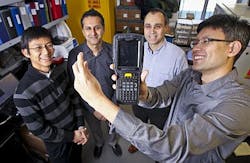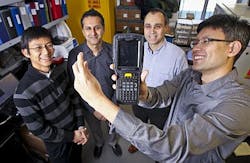Cytometry goes portable for HIV monitoring in remote areas
University of Toronto (Toronto, ON, Canada) researchers have developed a faster, cheaper portable device to track HIV progression in patients living in developing countries. The deviceâa portable cytometerâuses a multi-test particle detection and analysis platform that comprises a disposable plastic cartridge, an optical reader, and software.
The disposable cartridge in the device is engineered with tiny channels, reservoirs, and reaction chambers. For the CD4 test (a white blood cell test used to detect HIV), a dried reagentâan antibody designed to bind to CD4 cells combined with a fluorescent moleculeâis placed in the reaction chamber. When the blood mixes with the reagent, the antibody/fluorescent compound binds to the CD4 cells and 'lights up.' As blood flows through the channels, the optical reader and software count the CD4 cells and a liquid-crystal display (LCD) on the device displays the results within minutes. What's more, additional software can be added to the device to transmit results wirelessly to a central database.
Developed by student James Dou; Stewart Aitchison, Dou's research adviser; and researcher Rakesh Nayyar from Toronto's University Health Network, the portable cytometer makes it possible for health-care workers to monitor HIV patients in remote areas by testing their blood on the spot and receiving results within minutes, explains Nayyar.
An HIV patient's blood is tested to determine whether or not the patient currently needs antiretroviral medication, says Nayyar. The patient's status can change over time, making it necessary for health-care workers to routinely test patients' blood. And most flow cytometers, including those used to test HIV patients, are often the size of a photocopier and cost upwards of $100,000, with the cost of each blood test ranging from $75 to $100, says Nayyar.
The team's portable cytometer works a bit like glucometers used to test diabetes patients' blood, explains Dou, where a nurse pricks an HIV patient's finger and draws a sample of blood into a channel on a test chip. A few minutes later, the chip would go into the portable cytometer, where it would be tested, with results ready in minutes. The devices would cost about $5,000 to $10,000 each, with each test costing only a few dollars to process.
The team is working to make their next prototype capable of sending results wirelessly to a medical database, making it easier for doctors to keep track of patients in remote areas, says Dou. They're also scaling down their current prototypeâwhich currently is about the size of a loaf of bread and looks like a microscopeâto fit in one hand, he says. The new prototype should be a bit bigger than a smartphone and have similar capabilities, such as a camera, GPS, and wireless communication.
The team's goal is to have the handheld version ready to send to Malawi and Thailand for use in the field by mid-2012, says Dou.
-----
Follow us on Twitter, 'like' us on Facebook, and join our group on LinkedIn
Follow OptoIQ on your iPhone; download the free app here.
Subscribe now to BioOptics World magazine; it's free!

